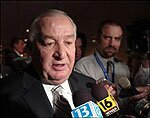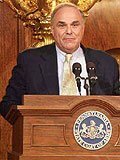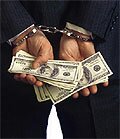Saturday, April 29, 2006
The War on Drugs is over: Drugs won
 If Pennsylvania and the United States fight the War on Terror the way they've fought the War on Drugs, we're in deeper trouble than the Federal Emergency Management Agency.
If Pennsylvania and the United States fight the War on Terror the way they've fought the War on Drugs, we're in deeper trouble than the Federal Emergency Management Agency.And this time we can't even blame it on the incompetence of Michael Brown.
You wouldn't know it from looking at U.S. "Drug Czar" John Walters' Web site, but our nation's anti-drug efforts are now in full retreat. Unfortunately, just like the war in Iraq, there's no exit strategy.
Right in time for Cinco de Mayo, Mexico's Congress has approved a measure decriminalizing small amounts of the most commonly used illegal drugs and President Vicente Fox's office said Saturday he plans to sign it into law.
When Fox does, police throughout that country will no longer bother to arrest anyone for possession of up to 25 milligrams of heroin, 5 grams of marijuana (about one-fifth of an ounce, or about four joints), 2.2 pounds of peyote, or 0.5 grams of cocaine - the equivalent of about 4 "lines," or small quantities of LSD, ecstasy or amphetamines.
The change in Mexican policy surprised U.S. officials Saturday, the Associated Press reports. State Department spokeswoman Janelle Hironimus said the department was trying to get "more information" about it.
One white flag is already being waved from atop the National Drug Intelligence Center in Johnstown, Pa. President Bush wants to slash the NDIC's funding from $39 million to $16 million next year and has said he wants to kill it off entirely.
Meanwhile, funding for state attorney general Tom Corbett's 22 regional drug task forces and 41 district attorney-controlled units has run out with months left in the fiscal year and their work has stopped throughout most of the state, the Pittsburgh Tribune-Review reported Friday.
The regional task forces, comprising of state drug agents, municipal police officers, deputy sheriffs and county detectives, were formed in 1986 to combat multi-county drug trafficking and are responsible for about 5,000 arrests annually. Officers are trained by the state and paid overtime by the state for task force work conducted outside their regular jobs.
The state's fiscal year runs from July 1 to June 30. But at least some of the task forces ran out of money in January - halfway through the year - because they are dealing with more street-level drug activity than ever before, state and local officials told the Trib.
Arrest numbers from Corbett's office are not conclusive. Local drug enforcement arrests went down from 5,750 in 2004-05 to 5,300 this year. The number of drug arrests due to grand jury presentments did go up though, from 154 in 2004-05 to 180 this year.
Corbett has proposed "a maintenance budget" for 2006-07, requesting just a $1.64 million increase - about 5 percent of the $35.3 million Pennsylvania spent this year to fight drugs.
Those drug enforcement costs represent 44 percent of the total $81.2 million Corbett's office was allotted in this year budget.
However, Gov. Ed Rendell's proposed budget for 2006-07 calls for flat funding for drug enforcement and a $2 million decrease overall for the attorney general's office, state budget figures show.
 Like bad military generals, drug czar Williams and attorney general Corbett are unwilling to admit defeat or even change their failing tactics. Instead, they're calling for even more cannon fodder.
Like bad military generals, drug czar Williams and attorney general Corbett are unwilling to admit defeat or even change their failing tactics. Instead, they're calling for even more cannon fodder."Without this additional funding we will be forced to furlough employees and reduce the efforts of the drug task forces," Corbett told lawmakers on March 1. "The Office of Attorney General cannot maintain the fight against drug dealers if we are not adequately funded."
As if more taxpayer dollars and more arrests could really turn the drug war around. They will merely mean more hypocritical press conferences in an election year as politicians put on a pretense of being tough on crime.
It's time to surrender a war that was as ill-conceived as Nancy Reagan's "Just say no" campaign, and based on at least as many wrong assumptions as the war in Iraq. This is merely decades of bad public policy coming home to roost.
For instance, citing a questionably politicized U.S. Food and Drug Administration (FDA) finding on April 20 that there are "no sound scientific studies" showing that marijuana can be used medically, Williams said this week, "We have a responsibility as a civilized society to ensure that the medicine Americans receive from their doctors is effective, safe, and free from the pro-drug politics that are being promoted in America under the guise of medicine."
But even the non-profit group Drug Free Pennsylvania posted a news item on its Web site that said the drug czar's comments (mp3) and the statement from the FDA flew in the face of seven-year-old findings by the Institute of Medicine at the National Academy of Sciences.
As for the FDA, its last appointed commissioner, Lester Crawford, who quit in September, is under federal investigation for allegedly abusing his position to manipulate stocks and for making false statements to Congress.
Look, I doubt Pennsylvania legislators, lawmakers in other states or Congress are prepared to legalize pot, give recreational users a get-out-of-jail-free card or even lift the unreasonably dranconian measure that prevents convicted pot smokers from getting college grants.
But the least the Legislature can do is spend the additional money Corbett wants where it will do the most good - in prevention education and providing free addiction treatment to anyone who wants it.
Nothing underscores that more than the plea deal conservative radio commentator Rush Limbaugh cut Friday following a three-year investigation by Florida into his illicit prescription drug use.
 Under its terms, Limbaugh will plead guilty to just a single charge of prescription fraud - and even that will be dropped if Limbaugh continues treatment for his painkiller addiction. He also agreed to pay the state $30,000 to defray the public cost of the investigation and must pay $30 per month for the cost of supervision, during which time he will continue regular drug tests.
Under its terms, Limbaugh will plead guilty to just a single charge of prescription fraud - and even that will be dropped if Limbaugh continues treatment for his painkiller addiction. He also agreed to pay the state $30,000 to defray the public cost of the investigation and must pay $30 per month for the cost of supervision, during which time he will continue regular drug tests.If that deal was good enough for the Florida state attorney's office - no stranger to prosecuting drug users, then lawmakers here should force Corbett and county prosecutors to save Pennsylvania taxpayers a fortune by striking similar agreements with recreational drug users.
The state could then save on drug investigation costs and pay officers overtime for doing other duties.
Treating drug users, rather than incarcerating them and cutting off their chances to improve themselves, would let us all retreat from this battlefield with some honor intact.


 |
| 
Friday, April 28, 2006
Louis, Louis
 Two weeks ago I asked the question, "Who is Louis DeNaples?"
Two weeks ago I asked the question, "Who is Louis DeNaples?"On Thursday, we found out he's the kind of guy who brings a Roman Catholic nun with him as a character witness while requesting a slots parlor license from the state's Gaming Control Board for his now-defunct Mount Airy Lodge.
DeNaples, 64, of Dunmore, told the board, "It's the best location in the Poconos," the Associated Press reported today.
The publicity-shy Keystone Landfill owner, auto parts dealer and banker wants to turn the former lover's getaway in the Poconos he bought for $25 million into a $360 million, 200-room slots resort by fall 2007.
Dressed in a black suit, DeNaples hunched at the podium as he read carefully in a "confident, staccato voice" from a script. "Mount Airy will be the signature resort of the Poconos," DeNaples said. "It will be done on time, it will operate with complete honesty and integrity, and it will be a project we can all be proud of."
Just like the song "Louie, Louie" by the Kingsmen, though, DeNaples is hard to discern, easily misunderstood and has been a subject of investigation by law enforcement.
A-way we go.
DeNaples pleaded no contest to a federal fraud felony decades ago. Federal and state agencies have also publically questioned his association with organized crime figures, but were not able to prove any wrongdoing.
That hasn't stopped most of the state's top officials - including Gov. Ed Rendell and Attorney General Tom Corbett - from accepting more than $1 million in campaign contributions from DeNaples over the last five years.
His "generosity knows no limits," Sister Mary Bonaventa, the administrator of a retreat house next to Mount Airy, told the gaming board. She also said DeNaples "lives out the Gospels in his everyday life."
He's also a man with an enemy.
 Bob Bolus Sr., whose Bolus Truck Parts competes with DeNaples in Dunmore, called him a crook with ties to the mob, according to the Pocono Record.
Bob Bolus Sr., whose Bolus Truck Parts competes with DeNaples in Dunmore, called him a crook with ties to the mob, according to the Pocono Record."DeNaples will lie, cheat and even allow someone to be imprisoned to get his own way," Bolus said in a prepared statement (pdf). "Louis feels he can just buy anyone he wants."
Bolus gave the board and reporters 67 pages about DeNaples' campaign donations to politicians and references to him in reports from the now-defunct Pennsylvania Crime Commission.
DeNaples' spokesman Kevin Feeley denied the accusation, saying, "He has no ties to organized crime." He called Bolus "someone who clearly has an ax to grind on a personal level."
Bolus claimed DeNaples helped ruin him in a complicated case from the early 1990s in which Bolus was convicted of receiving stolen property - a front-end loader - and spent four months in a work release center.
DeNaples is no stranger to criminal court, either. He received a suspended sentence in 1978. He pleaded no contest to felony fraud after a jury could not reach a verdict on charges he tried to defraud the federal government out of $525,000 in the wake of Tropical Storm Agnes.
"You can paint a leopard, you can get rid of his spots, but in this case, the spots don't go away," Bolus said.
DeNaples is vying for one of only two free-standing slots parlor licenses available in the state.
A competing proposal called Pocono Manor would build a $1.2 billion, 750-room luxury hotel/casino on a 375-acre parcel in Tobyhanna Township.
 Put forth by New Jersey real estate developer Greg Matzel, 41, the plan drew fire because its proposed height at 16 stories would make it the tallest building in the Poconos.
Put forth by New Jersey real estate developer Greg Matzel, 41, the plan drew fire because its proposed height at 16 stories would make it the tallest building in the Poconos.One woman complained that the proposed casino would be constructed a quarter-mile away from an elementary school.
Pocono Manor has been heavily criticized by an anti-casino group in Tobyhanna Township, but Matzel said 1,500 supporters have signed a petition in favor of his project in the last 10 days.
Labels: casino, Ed Rendell, Louis DeNaples, slots
 |
| 
Thursday, April 27, 2006
Kissing butt with Ed Rendell
 I warned Pennsylvania Gov. Ed Rendell.
I warned Pennsylvania Gov. Ed Rendell.Three weeks ago in "Lies, more lies and statistics" I repeatedly wrote that "unless Fast Eddie puts a giant foot in his mouth or does something really stupid, he's virtually a shoe-in to win reelection."
And this is exactly what I had in mind.
Rendell shoved a Shaq-sized loafer in his gaping maw on Tuesday, telling members of the Lower Bucks County Chamber of Commerce he signed last year's now-repealed pay raise for top government officials to "kiss a little butt."
D'oh. Open mouth, insert shoe.
"If I didn't sign it, I might have been governor for the next five years but I would have gotten nothing done, literally, because I need the cooperation of the Legislature," Rendell said. "I've had remarkable success in getting seven major initiatives enacted into law. ... So you have to kiss a little butt."
|
"If I didn't sign it, I might have been governor for the next five years but I would have gotten nothing done, literally, because I need the cooperation of the Legislature. ... So you have to kiss a little butt." - Ed Rendell |
|
He could have curtailed his honesty a bit by saying he was willing to cooperate because two of the three branches of government requested the raise.
He could have lied and said he was politically against the move, but acquiesced to keep the peace.
He could have pulled a Drew Rosenhaus and simply said, "The issue is dead. ... Next question!"
Not Ed.
He had to be brutally honest and exposed his total lack of political courage. The emperor now officially has one shoe and I really don't want to see him with no clothes.
Rendell's gaffe - which was buried on page 3C of Wednesday's Bucks County Courier Times, for whom I used to be the online editor (I still do sports for it and two other Calkins Media papers as the sports editor at phillyBurbs.com) - is now a statewide mini-scandal.
 In a metaphor even TV football commentator Rendell can understand, the Pittsburgh Tribune-Review picked up the ball and ran with it.
In a metaphor even TV football commentator Rendell can understand, the Pittsburgh Tribune-Review picked up the ball and ran with it.The "jaw-dropping statement" surprised Lenny Alcivar, spokesman for Republican gubernatorial candidate Lynn Swann's campaign, which up to now had been languishing.
"If the 22 years of experience Ed Rendell touts requires kissing a little butt, Pennsylvanians don't want that kind of experience," Alcivar told the Trib.
Once the Trib did its story, the Associated Press had to write something too. So now every paper in the state will report Rendell's and Alcivar's comments tomorrow.
Way to help your opponent Ed, and not the taxpayers, voters or yourself.
Is franking short for Frankenstein privilege?
 If the Tribune-Review came in second on the Rendell story, they definitely came in first with this one.
If the Tribune-Review came in second on the Rendell story, they definitely came in first with this one.We all know dead Pennsylvanians are not supposed to be able to vote. But apparently that doesn't stop the House Republican Caucus from sending them birthday cards and wishes for "the best happiness and health."
Those belated sentiments on behalf of state Rep. Michael Diven, R-Beechview, arrived Saturday - four years too late for James J. Bradley Jr., of Baldwin Township, who would be turning 73 if he hadn't died in 2002.
Diven had reason for wishing his dead constituent well. After all Bradley's signature and those of other deceased voters magically appeared in March on a nominating petition for Diven's reelection.
Diven apologized three weeks ago on a talk radio program for the bogus petition, a broadcast Bradley's widow heard. Then she got the birthday card for her late husband. As you can imagine, she is more than a little confused and upset.
"I was in disbelief, especially after what had just happened with the petition," Bradley told the Tribune-Review. "Wouldn't you think at this point they would have checked to make sure this doesn't happen?"
The mailing was a mistake, Diven said. "I sincerely apologize to Mrs. Bradley. It was definitely not intentional."
The names and addresses of birthday card recipients are generated from a central data resource provided by the House GOP caucus, Diven said, adding the list is not as up-to-date as it should be.
 Diven, who switched from being a Democrat last year, withdrew from the primary after his nominating petitions were challenged, but before the Commonwealth Court ruled on them. He said a campaign staffer just copied names from an outdated street list.
Diven, who switched from being a Democrat last year, withdrew from the primary after his nominating petitions were challenged, but before the Commonwealth Court ruled on them. He said a campaign staffer just copied names from an outdated street list.His reelection hopes are not dead, though. Diven has said he may run for a fourth term as either a write-in candidate in the May 16 primary or as an independent candidate in November.
Maybe he'll win too, in another life.
 |
| 
Wednesday, April 26, 2006
Pa. studies wrongful convictions, punishes more bad lawyers
 It didn't make headlines Tuesday, but the state Senate unanimously approved a bill to create a 30-member innocence commission to study how and why eight Pennsylvanians were wrongly convicted of crimes.
It didn't make headlines Tuesday, but the state Senate unanimously approved a bill to create a 30-member innocence commission to study how and why eight Pennsylvanians were wrongly convicted of crimes."These exonerations have led to questions about the operation of the criminal justice system in these specific cases," Sen. Stewart J. Greenleaf wrote in a February press statement when he introduced Senate Bill 1069.
"The commission I am proposing would review these cases to see the problems in the system that led to the conviction of innocent people," Greenleaf wrote. "If we can learn from mistakes and correct the flaws that resulted in wrongful convictions, then the commission will have served a good purpose."
Most of the eight wrongly-convicted citizens were exonerated by the use of DNA testing on evidence, he noted. That raised the total nation-wide to 174 innocents.
The commission's unpaid members will be appointed by the Governor, the State Chief Justice, and the General Assembly and be "must include at least one member from the following constituencies: prosecution, defense, law enforcement, corrections, judiciary and victim assistance," the bill says. "In addition, the commission may include representatives of academia, private and public organizations involved in criminal justice issues and other criminal justice experts."
 In other court matters, Pennsylvania punished 347 lawyers last year. Discipline ranged from admonition to disbarment for allowing clients to perjure themselves, misusing client funds, ignoring a subpoena, practicing without a license and having criminal convictions.
In other court matters, Pennsylvania punished 347 lawyers last year. Discipline ranged from admonition to disbarment for allowing clients to perjure themselves, misusing client funds, ignoring a subpoena, practicing without a license and having criminal convictions.That's 347 out of 56,900 practicing lawyers in the state. (Insert bad lawyer joke here.)
What is no joke is that Pennsylvania has gone from having the worst disciplinary system for attorneys in the nation to the fifth-best in less than four years, according to Halt Inc., a nonprofit legal-reform group.
Based on the group's suggestions, the Disciplinary Board of the state Supreme Court established a user-friendly Web site and made its records and decisions available for the public to review.
Those records show the number of lawyers being disciplined has nearly doubled over the same time span - up from 175 in 2002.
One criticism buried deep in an Associated Press story about the board's improvements was that its membership is still a dumping ground for patronage and nepotism by the justices.
The current board includes relatives of Justices Sandra Schultz Newman and Max Baer.
"These appointments are often friends of justices, relatives, people who know justices, maybe contributors," said Sam Stretton, a West Chester lawyer who defends attorneys and judges who run into legal trouble. "A lot of these are good people. But what I'm getting at is the process leaves a lot to be desired."
The Disciplinary Board's funding - about $7.8 million last year - comes entirely from a $175 annual fee that all lawyers have to pay. The fee also underwrites a fund that reimburses people for damages caused by their attorneys.
 Contrasting that are the licensing boards of all other Pennsylvania professionals - from doctors, dentists, pharmacists and nurses to engineers, car salesmen, realtors and cosmetologists. Each falls under the jurisdiction of the state Department of State and requires $28.5 million from state taxpayers.
Contrasting that are the licensing boards of all other Pennsylvania professionals - from doctors, dentists, pharmacists and nurses to engineers, car salesmen, realtors and cosmetologists. Each falls under the jurisdiction of the state Department of State and requires $28.5 million from state taxpayers.The Department of State launched a Web site three years ago to at least tell the public the status of the licenses of those professionals and whether they have received any disciplinary action.
A bipartisan, 10-bill package to improve the oversight of those professions is currently being studied by the House Professional Licensure Committee.
I last wrote about the lawyer database and the other professionals' Web site in my Pave the grass column on phillyBurbs.com, "Public spanking" on July 7, 2003.
Find out the license status of a doctor, lawyer or other professional for yourself at these Web sites.
In Pennsylvania:
- Lawyers discipline database
- Doctors and other professionals database
In New Jersey:
- Layers discipline (pdfs only)
- Health professionals database
 |
| 
Tuesday, April 25, 2006
Today's forecast: Partly sunny with chance of an eclipse
It's OK, I'm a nonprofit
Got to give it up to the Pittsburgh Tribune-Review for digging out that six state lawmakers have directed nearly $29 million in taxes to nonprofit groups with which they have close ties.
The paper's examination of the nonprofits found that some of the taxpayer money is going to a historic preservation group that provides free housing to its sponsor, Rep. Eugene McGill, R-Montgomery, and an economic development agency that shares staff and office space with its sponsor, Rep. Michael R. Veon, D-Beaver.
 McGill claimed the $47,000 in state grants the Historic Property Preservation Institute received was to acquire and restore historic Montgomery County properties. Although he lives rent-free in one house, he said he keeps detailed records of the renovations he personally does.
McGill claimed the $47,000 in state grants the Historic Property Preservation Institute received was to acquire and restore historic Montgomery County properties. Although he lives rent-free in one house, he said he keeps detailed records of the renovations he personally does.Lovely, kind of a do-it-yourself Habitat for Humanity program for rich people. Wonder how he'd vote for squatters' rights in abandoned city buildings?
Other lawmakers who have obtained special state grants to fund nonprofits include House Speaker John M. Perzel, R-Philadelphia; Sen. Vincent J. Fumo, D-Philadelphia; Rep. Dwight Evans, D-Philadelphia; and Rep. P. Michael Sturla, D-Lancaster.
I already knew about Fumo's nonprofit, which is currently under investigation by the FBI thanks to its delete-now-answer-questions-later policy and the seizure of the Vince of Darkness' computer hard drives.
Carpe per diems
Now that the sun's up, let's seize the day and the extra cash lawmakers pay themselves.
 The Philly Inquirer deserves a couple of snaps for discovering that a dozen Pennsylvania legislators collected more in per diems last year than lawmakers earned in salary in 28 other states - with some getting more than $46,000 on top of their $72,187 base salaries.
The Philly Inquirer deserves a couple of snaps for discovering that a dozen Pennsylvania legislators collected more in per diems last year than lawmakers earned in salary in 28 other states - with some getting more than $46,000 on top of their $72,187 base salaries.A per diem is supposed to help Legislators pay for their lodgings, meals and gas for their taxpayer-funded cars while they're in Harrisburg. But the payments are among the most generous of all states at $141 per day.
The rules are few, and any lawmaker can get the money if they just show up to work in the Capitol, even when the Legislature isn't in session.
My question - would the Inqy have dug this out if taxpayer advocate and lieutenant governor candidate Gene Stilp had not done his 26.2-mile march two weeks ago to protest state Sen. David Brightbill's per-diem?
Stilp for Pa. Ombudsman!
If taxpayer advocate Gene Stilp fails in his bid to become lieutenant governor (on the platform of eliminating that office) and I think it likely, the next governor - be it Ed Rendell or Lynn Swann - should really consider creating a new position for him.
How does Pennsylvania Ombudsman sound?
 Each of Pennsylvania's departments and agencies has a person who hears complaints from the public and tries to find both the truth and a way to resolve the issue.
Each of Pennsylvania's departments and agencies has a person who hears complaints from the public and tries to find both the truth and a way to resolve the issue.However, there's no one to field complaints state-wide on a wide variety of issues - including the actions and inactions of the governor, the Legislature and the Supreme Court.
Given Stilp's penchant for being a pain in the patoot, he'd be perfect. Plus, he's quotable and not easily frustrated.
Case in point, Stilp lost a Commonwealth Court lawsuit this week to force the Legislature to let the state Auditor General audit the lawmakers' books.
Under a 1970 law, audits of the Legislature are conducted at least annually by a certified public accountant. The accountant is selected by a panel of four legislators and four legislative appointees called the Legislative Audit Advisory Commission.
"Leaving the details of who, how and when to the General Assembly was not an accident, but a conscious choice", Judge Dan Pellegrini wrote in the majority opinion.
Before you start booing Pellegrini, know that he's done more in the last two decades to expand the definition of what is an open record than any other judge in Pennsylvania.
Plus, Pellegrini's ruling in Stilp's case does make sense. Can't have a person from the executive branch auditing the legislative. Sort of like you're not supposed to have the state Supreme Court's chief justice help write legislation.
Undaunted, Stilp said he may appeal to the state Supreme Court. You've got to admire his chutzpah.
Judge orders his name off property tax database
Beaver County President Judge Robert Kunselman has ordered the county assessment office to remove the names and addresses of county judges from its Web site.
 "What we really want to do is make it, not impossible, but not so easy to find out where we live," Kunselman said.
"What we really want to do is make it, not impossible, but not so easy to find out where we live," Kunselman said.The assessment office Web site lists the owner's name, address, estimated value and other information for most properties in the county. Computers users can access the information with just a name.
"My position is this is all public record," said Chief Assessor Michael Kohlman.
Here's hoping Kohlman appeals. If not, how soon until all of our elected leaders ask for this unequal privilege in clear violation of the state Open Records law? And without the public keeping tabs, who is to say they will even be taxed?
Allegheny County last year removed the names of all federal, state and county judges from a real estate Web site there following a federal judge's request.
Some judges grew concerned about such assessment Web sites following the killing last year of the husband and mother of a federal judge in Chicago and the murder of a county judge in Atlanta.

It's good to be the king
Republican Assemblymen Bill Baroni and Kevin O'Toole introduced a bill Tuesday to give residents more information about the salaries and benefits paid local school chiefs.
Their goal was to shed light on job perks that pad officials' pensions and cost taxpayers millions which were discovered in a recent report by the State Commission of Investigation.
The report found dozens of school officials received perks including clothing allowances and life insurance policies. One of the most common was allowing administrators to cash in unused sick and vacation time each year and at retirement. Some districts added cash stipends in the administrators' final years before retirement to boost their pensions.
Corzine only pol to get rid of all Kushner cash
Props to the Bergen County Record for following up on the cash convicted tax dodger, illegal donor and setup artist Charles Kushner doled out to Democrats in New Jersey and the national party.
 Most of the campaigns and committees that received thousands of dollars from Kushner - and in the case of the Democratic National Committee, millions of dollars - got rid of only the fraction that federal regulators had deemed illegal, The Record found.
Most of the campaigns and committees that received thousands of dollars from Kushner - and in the case of the Democratic National Committee, millions of dollars - got rid of only the fraction that federal regulators had deemed illegal, The Record found.Only Gov. Jon S. Corzine donated the full amount Kushner gave his campaign, the paper found. After receiving just $88,000 from Kushner Companies, Corzine donated $91,000 to charity in August 2004. He then paid another $50,000, the portion of the $88,000 that the FEC said was illegal, to the Treasury Department in February 2005.
Take a hint Ed Rendell. Get rid of your cash from Louis DeNaples.
Sunshine on his shoulders
 Former New Jersey lawmaker Byron M. Baer was inducted Saturday into the Open Government Hall of Fame for his work in helping to establish that state's laws governing access to public meetings and records in the early '70s.
Former New Jersey lawmaker Byron M. Baer was inducted Saturday into the Open Government Hall of Fame for his work in helping to establish that state's laws governing access to public meetings and records in the early '70s.In 2002, he was co-sponsor of the state's revised open-records law and helped to defeat attempts to weaken the bill as it moved through the Legislature.
The Hall of Fame is sponsored by the National Freedom of Information Coalition and the Society of Professional Journalists.
 |
| 
Monday, April 24, 2006
Gas pains: Rendell's call for oil profit tax a bit hard to stomach
 Was Gov. Ed Rendell being earnest, making a political statement for the Democratic Party he once chaired or just doing some electioneering Monday when he called on President George Bush to pass a windfall profits tax on oil companies?
Was Gov. Ed Rendell being earnest, making a political statement for the Democratic Party he once chaired or just doing some electioneering Monday when he called on President George Bush to pass a windfall profits tax on oil companies?Perhaps a mix of all three.
"It is simply bad economic policy to let profiteering continue unabated," Rendell said at a news conference next to pumps at a Harrisburg gas station. "There is no excuse for this - absolutely no excuse. It's embarrassing."
In 1999, U.S. oil refiners made 22.8 cents for every gallon of gasoline refined from crude oil, according to Rendell. Last year, they made 99 cents on each gallon sold.
I won't argue that oil companies are reaping record spoils and I can't dispute the accuracy of Rendell's numbers. However, I think he fails to factor in the rise in both inflation and gasoline demand over those seven years.
His motives, however, are bolstered by Republican U.S. Sen. Arlen Specter, who similarly called Sunday for a tax on excessive oil profits.
What Rendell and Specter will only hint at publicly is that this latest round of gas gouging was probably preventable.
Why did oil companies wait until the normal spring driving upswing to switch from the chemical additive MTBE to Ethanol in the refining process, which they blame in part for the current shortage?
They had plenty of time to do it in winter, when gasoline demand is normally lower, and which turned out to be one of the warmest on record in the Eastern U.S. With the drop in demand for natural gas, they should have been able to make the switch long before now.
Of course, if Congress had only acted last year when they hauled oil company executives in to testify about the Bush Administration's secret energy policy meetings, the companies might have thought twice about playing games like this.
The state also shares some blame.
 Pennsylvania has the third-highest gas taxes in the nation - 31.1 cents per gallon - which it uses to pay for road maintenance. That's up from 25.9 cents per gallon just two years ago. Only Wisconsin and New York now have higher state taxes, 32.1 cents and 31.9 cents respectively.
Pennsylvania has the third-highest gas taxes in the nation - 31.1 cents per gallon - which it uses to pay for road maintenance. That's up from 25.9 cents per gallon just two years ago. Only Wisconsin and New York now have higher state taxes, 32.1 cents and 31.9 cents respectively.Why not cut the state tax rate in the short term to give drivers a break? Oh I'm sorry, why should the state give up any revenue when it's more economical for Rendell to score political points at a gas pump?
While he was there, Rendell also said he hopes the current prices prompt the state Senate to pass Bill 450, which calls for a fine of up $10,000 a day for anyone found guilty of profiteering.
One can only wonder if state Attorney General Tom Corbett's office had more aggressively pursued profiteering cases against gasoline retailers last year, would they now be more hesitant to raise prices on a daily basis?
Out of the 1,000 gas gouging complaints Corbett's office received last summer, only about half were investigated, spokeswoman Barbara Petito told the Associated Press two weeks ago.
Of those 500 investigations, only two cases of price gouging were actually prosecuted.
On Sept. 1, three days after Katrina hit, the Valley General Store in Petersburg got a fuel delivery on Sept. 1, three days after Katrina hit, and paid about $3.35 per gallon, court papers state. But the store unfairly markedup the price to $3.99, putting its pumps 80 cents higher than the average price in the surrounding area,
At the Turkey Hill in Mountaintop, regular gas went up 30 cents to $3.19 on Sept. 2. At the chain's store in Shillington, the price shot up 56 cents to $2.99 over just three days even though the wholesale cost did not change.
All three stations agreed to settle the charges without admitting any wrong doing and have been fined a total of $7,000.
 More charges could come, Petito said.
More charges could come, Petito said.My question is why even bother pursuing it if you're not going to make examples of the stations that do gouge? I'm sure it cost the state more than $7,000 in manpower and attorney fees to prosecute those two cases.
This in a state where the governor just accused President Bush of having a "bad economic policy to let profiteering continue unabated."
New Jersey also has a law on the books against gas price gouging. And while that state similarly let two profiteering oil companies settle cases without admitting any wrongdoing, their fines totaled $640,000.
 |
| 
Sunday, April 23, 2006
White collar crime day in Philly?
 It could only happen in Philadelphia - May 3rd is the National Association of Criminal Defense Lawyers' White Collar Crime Day!
It could only happen in Philadelphia - May 3rd is the National Association of Criminal Defense Lawyers' White Collar Crime Day!No, the lawyers won't be committing crimes. At least not until after their full day seminar at the Sheraton Society Hill, where they'll focus on giving criminals in suits the best defense their ill-gotten money can buy.
As if nouveau riche scumbags needed better lawyers.
According to the NACDL's Web site, "Seasoned white collar lawyers and professionals will share their insight on how to represent white collar defendants in a wide array of cases. This program will appeal to both seasoned white collar veterans who want to broaden his or her expertise as well as serve as a primer for those who are interested in starting a white collar practice. We will update you on current cases and introduce you to the relevant issues and precautions in Securities Law, Criminal Tax Enforcement, Healthcare Fraud, Mail and Wire Fraud, Sentencing in a Post-Booker World, as well as two panels on dealing with joint defense agreements, parallel proceedings, immunity agreements, and the when, where, why, and how to proffer."
Proffer means to turn state's evidence, which sounds like a last resort for these folks.
A better way of celebrating this most auspicious holiday, short of spitting in the shrimp cocktail or pulling the hotel fire alarms (I'd never advocate such stuff), would be to create more clients to keep these lawyers busier than ever.
To that end, if you know someone who's carrying the blackbag, got their hand in the till or has turned the shakedown into a fine art, here's some folks who would love to hear from you:
- Philadelphia City Controller Alan Butkovitz.
- Philadelphia's Ethics Board.
- Philadelphia's Committee of 70 (for vote fraud).
- Pennsylvania Attorney General Tom Corbett, who recently started a seven-lawyer Public Corruption Unit when he wasn't busy taking campaign finance checks from felon and slots parlor hopeful Louis DeNaples.
- The state Ethics Commission for public officials who sell their office or are hiding money.
- The state Department of State for complaints against licensed professionals and campaign finances of statewide elected officials.
- Ralph W. Burnham, chief of the Pennsylvania Insurance Department's Anti-fraud Compliance Division.
- The Pennsylvania Department of Banking.
- Donald L. Patterson, Pennsylvania's Inspector General.
- The FBI (when they're not too busy taking proffer from Rick Mariano and wiring up Harrisburg lobbyist John J. O'Connell)
- The Internet Crime Complaint Center.
- U.S. Attorney General Alberto Gonzales (when he isn't too busy making excuses for President Bush or letting his assistants sabotage the case against Big Tobacco).
 |
| 
This Week's Rants | The Daily Rant Archives

This work is licensed under a Creative Commons Attribution 2.5 License.

This work is licensed under a Creative Commons Attribution 2.5 License.


